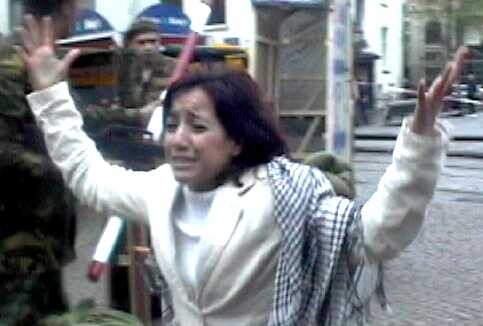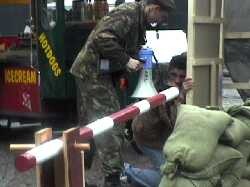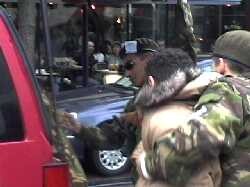The Electronic Intifada 5 May 2003

‘Mother’ cries for her son after ‘soldiers’ arrested him at the mock checkpoint (Photo: AEF, 2003)
The Netherlands has its own way of commemorating the Second World War and celebrating the country’s liberation from five years of occupation. Unlike most countries, the Netherlands sets aside two days to mark these events. The first is a day of solemn commemoration; the second a day of public rejoicing with the young at the centre of attention.
On May 4, the Dutch nationally commemorated the fallen victims. Wreaths were laid on the Dam Square, concluding with a two minute silence to honour the dead. Today, May 5th, with concerts and festivities taking place all over the country, the Dutch celebrated the 58th anniversary of the end of Germany’s occupation of the Netherlands on 5 May 1945.

‘Soldier’ shouts at child in front of the mock checkpoint (Photo: AEF, 2003)
The main theme of the street theatre performance was an Israeli military checkpoint. The performers emphasized the mental, physical and emotional abuse that Palestinians undergo multiple times daily in the course of trying to meet their most basic needs for work, health, food and education provisions.
In a setting of sandbags, barbed wire and blockades, performers were divided between Israeli military soldiers carrying weapons and Palestinian citizens trying to run their daily errands.
The scenes varied in accordance with the reality in Palestine, and included the random detentions of Palestinian men, thrown into military jeeps on their way to Israeli prisons. Palestinian women were violently separated from their sons and forced to watch their malicious treatment by soldiers for the mere fact that they are male. Lines of people, waiting unnecessarily in harsh weather conditions (in this case rain) completed the picture.

‘Soldiers’ push detainee in a truck next to the mock checkpoint (Photo: AEF, 2003)
For Palestinian onlookers it was an emotional experience as it was performed with accuracy and detail, reliving the humiliation and frustration. For onlookers from other nationalities it was a learning experience. Many had no idea that Palestinians where treated so roughly, and felt betrayed by biased media coverage. They felt betrayed as they thought they where well informed. Others who were more informed told activists that they hoped for a fair and just peace. Many pro-Israeli onlookers shrugged angrily at the organizers, unwilling to fathom the bitter pill of confrontation. They chose to turn their backs and walk away.
Related Links: